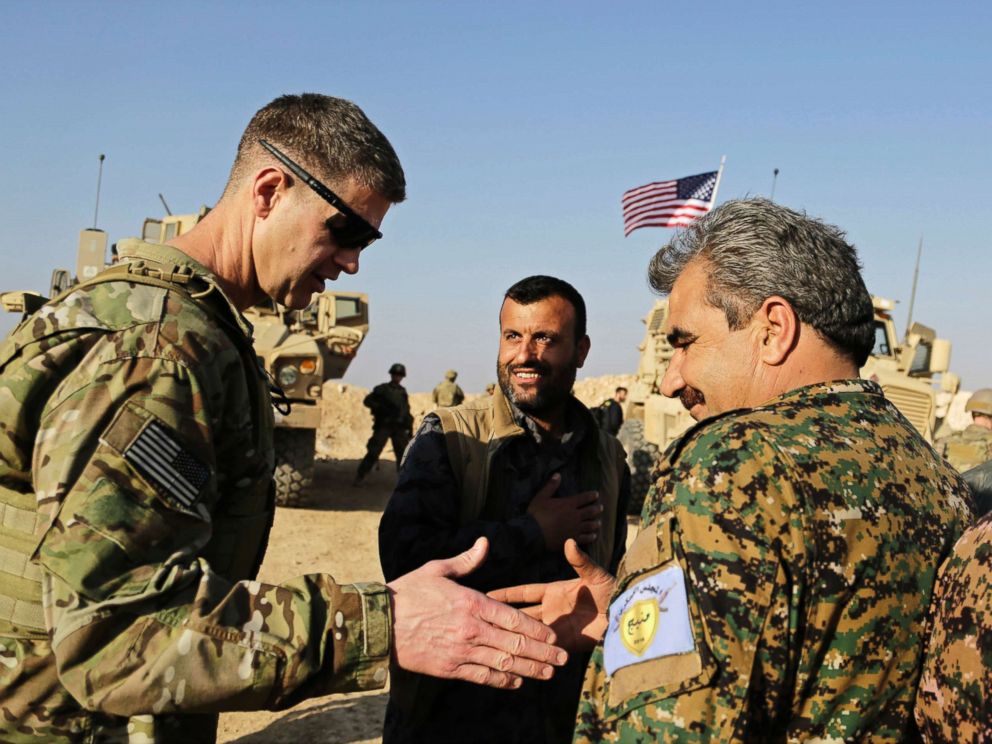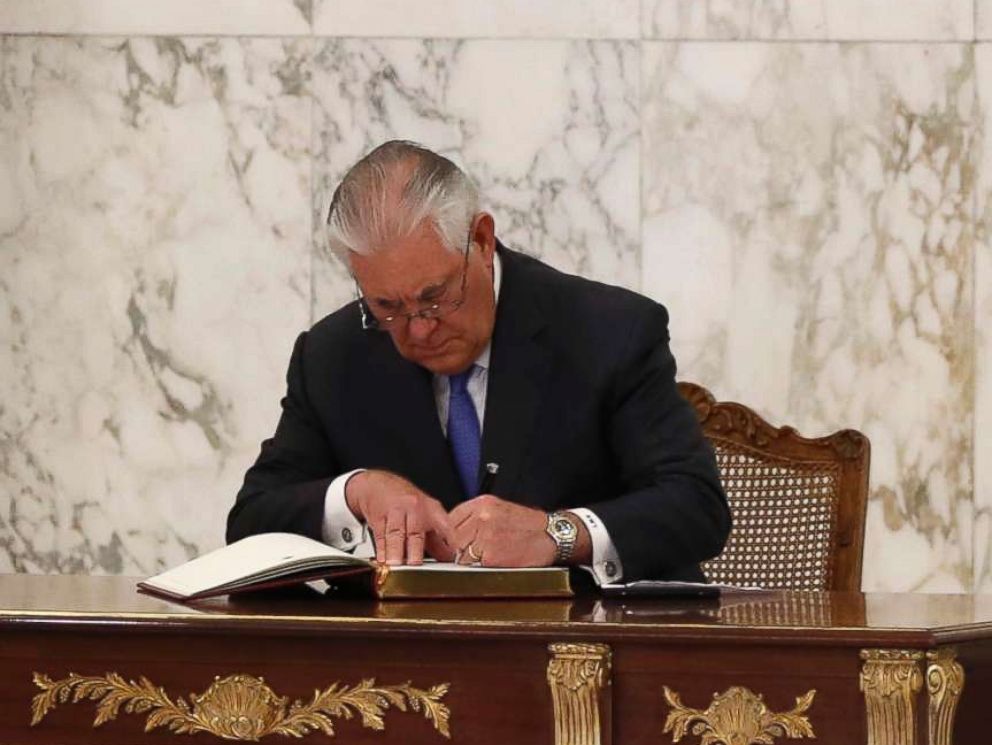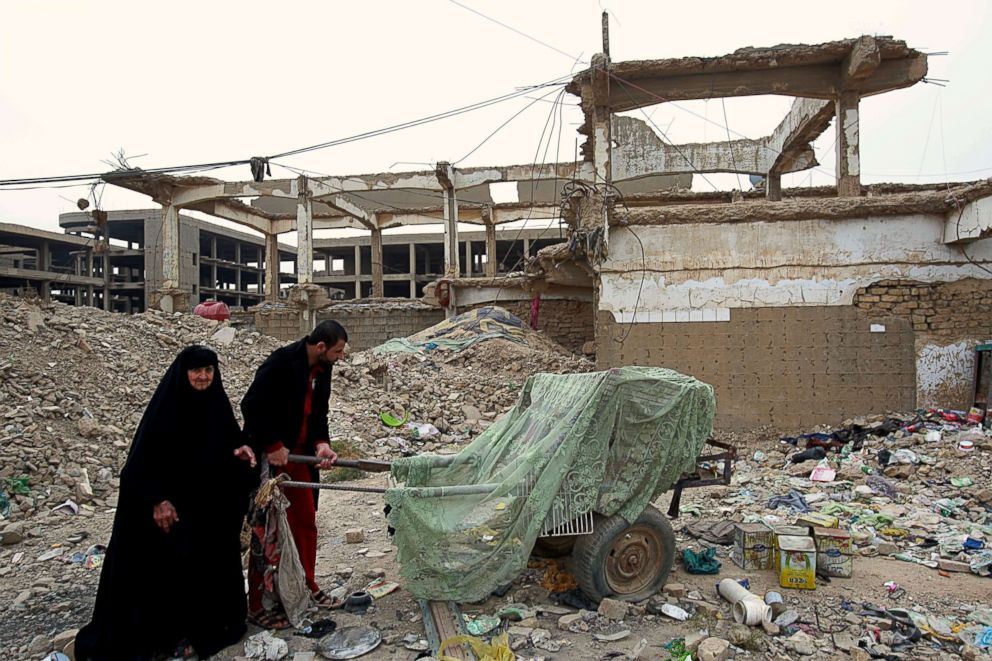On Middle East trip, Tillerson navigates Trump's rhetoric, promises and regional role
Secretary Tillerson now faces a big challenge and a possible "Ottoman slap".
— -- On his fifth day traveling across the Middle East on a key trip to assert American leadership at a chaotic time, Secretary Tillerson now faces his biggest challenge — and a possible "Ottoman slap" — after landing in Turkey and meeting with leaders of an ally incensed at the U.S.
For Tillerson, the Trump administration's top diplomat, it has been a week of struggling to walk the line between abiding by President Trump's rhetoric and promises and declaring the U.S.'s role in the region as one of stability.
It's an especially unstable time as the conflict in Syria threatens to drag foreign powers into a world war, Iran extends its influence further into other countries from Lebanon to Yemen, America's Gulf allies continue to defy U.S. demands to end their feud, and Iraq searches for funds to rebuild its bombed-out cities and stave off a new generation of terrorists.
"Stability" seemed to be the theme of the trip, with Tillerson praising allies like Kuwait and Jordan for being "partners in stability" and urging other countries to invest in "stabilization" efforts in Iraq and Syria, from ceasefire zones to de-mining and rubble removal missions.
But it's America's relationship with Turkey and the rising rhetoric between the allies that is helping to undermine stability now. As Turkish Foreign Minister Mevlut Cavusoglu said Monday, relations are at a "very critical point," where they'll either be fixed, "or deteriorate altogether."
Last week, the top U.S. commander with the coalition to defeat ISIS visited the Syrian city of Manbij, a Kurdish stronghold near the border with Turkey. The Kurds, many of whom the U.S. has supported as de facto American ground forces against ISIS known as the YPG, are considered terrorists by Turkey. After Turkey threatened an invasion of Manbij and demanded U.S. troops leave, that commander, Lt. Gen. Paul Funk, said, "You hit us, we will respond aggressively. We will defend ourselves."

The response this week from Turkey was fierce.
"Those who say they will give a sharp response have not been hit by the Ottoman slap," warned Turkish President Recep Tayyip Erdogan, according to Turkish state media. Tillerson's spokesperson dismissed the "slap" comment on Tuesday, saying the U.S. was "used to that kind of rhetoric," but "taking the high road" and not responding.
Tillerson met with Erdogan and Foreign Minister Cavusoglu Thursday behind closed doors for a three-and-a-half hour dinner — although Erdogan's office later released video that shows the president and Tillerson silent locked in a frozen handshake for the official photographer.
A State Department spokesperson traveling with Tillerson said he "appreciated" Erdogan's "invitation to meet... The two engaged in a productive and open conversation about a mutually beneficial way forward in the U.S.-Turkey relationship. We look forward to continued progress with our important NATO ally in conversations with Foreign Minister Cavusoglu tomorrow."
Despite that position as a NATO ally, Turkey has become a difficult matter for the U.S.
In addition to anger over U.S. support for Kurdish fighters, Turkey demands the extradition of Fetullah Gulen, a Turkish cleric who is a legal permanent resident in the U.S. and is blamed by Erdogan for a failed coup against him in July 2016. Erdogan has also blasted the U.S. for the trial of a Turkish-Iranian banker who pleaded guilty to violating international sanctions on Iran in a scheme that implicated senior members of Erdogan's government and the president himself.
Cavusoglu demanded Monday that the U.S. start taking action, instead of making more promises: "We don't want promises and pledges from the U.S.. We want concrete steps... the trust that has been lost needs to be restored, and the cause of the lost trust is U.S."

In return, the U.S. has expressed increasing alarm over Erdogan's consolidation of power since that coup, including a sweeping crackdown on opposition parties, the media, and lawyers and academics. Several American citizens have been caught up in the crackdown as well, including a NASA scientist named Serkan Golge sentenced to seven and a half years in prison last week and a pastor named Andrew Brunson still imprisoned and awaiting trial.
Relations are so strained that some members of Congress have even begun to advocate for sanctioning Turkey, such as Republican Sen. James Lankford of Oklahoma.
"We certainly do have issues in dispute," said State Department spokesperson Heather Nauert Thursday. "Sanctions are always on the table with regard to different nations in areas that we may have difficulties with, but you also know we don't preview sanctions."
But Tillerson dismissed the tensions in the relationship during a press conference in Beirut, Lebanon, shortly before traveling to Turkey's capital Ankara.
"You must be looking at a flat wall, because there are so many aspects of the Turkey-U.S. relationship which are very important and very positive," he told reporters. "Our endpoint objectives are completely aligned. There’s no gap between them," he added, before admitting, "We have some differences about tactically how to achieve that endpoint objective."

Elsewhere on his trip, Tillerson has been challenged to square Trump's "America First" foreign policy with American leadership. Trump began the week touting infrastructure investment in the U.S. and decrying "so stupidly spending $7 trillion in the Middle East." But on Tuesday, Tillerson announced $200 million for recovery efforts in Syria and $3 billion pledge of loans and guarantees to Iraq from the U.S. Export-Import Bank -- and signed a new memorandum of understanding with Jordan on Wednesday that increase annual U.S. aid to the country by $275 million a year through fiscal year 2022.
The new funds came not just in the face of Trump's promises to "start investing in OUR Country!" but also in contrast to the threats from Trump and U.S. ambassador to the United Nations Nikki Haley, who promised to "take names" and punish countries who voted against the U.S. at the U.N. in December. Iraq and Jordan both voted to criticize Trump's decision to move the U.S. embassy to Jerusalem.
Similarly, Trump's budget proposal Monday had no specific cuts because of the vote, according to one senior State Department official — although it slashed the agency's overall budget by nearly one-third. The proposed cuts were decried by foreign policy groups — and dismissed by Capitol Hill.
Tillerson, in turn, dismissed the criticism on Monday, telling reporters, "We’re confident that we have the resources we need to execute against the President’s foreign policy objectives."




